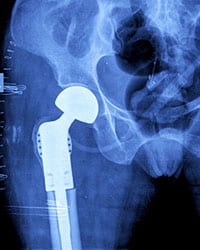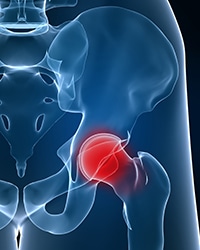Arthritis can damage the hip to the point that everyday activities like getting in and out of a chair, putting on your shoes, or even walking may become difficult. The hip can become very stiff, and may even be uncomfortable and painful while you are resting.
If nonsurgical treatment methods fail to relieve hip pain, surgery may be an option.
Anatomy Of The Hip
In order to understand how arthritis affects the hip and how a hip replacement is performed, it helps to understand how the hip works. The hip is one of the largest joints in the body. It is a ball-and-socket joint, meaning that the rounded, ball-shaped head at the upper end of the femur (thighbone) fits into a socket in the pelvic bone.
Articular cartilage covers the bones in the joint to allow the joint to move smoothly, and a thin tissue called the synovial membrane surrounds the joint. The synovial membrane secretes a small amount of fluid that reduces friction in the joint. Ligaments hold the “ball” portion of the joint in the socket.
Arthritis damages the cartilage that lines the joint and can eventually cause the cartilage to wear away completely, leaving the bones to rub together. This creates pain and stiffness in the hip that may lead to a hip replacement.
Candidates For Hip Replacement Surgery
A medical evaluation is necessary to determine whether you are a good candidate for hip replacement surgery. Evaluation involves a medical history, a physical examination, and X-rays and other diagnostic imaging tests to determine the extent of damage to the hip.
Candidates for hip replacement surgery generally have pain and stiffness in the hip that does not improve with nonsurgical treatment methods like medication and physical therapy. Pain and stiffness has often progressed to the point that everyday activities like walking, bending, or lifting the leg may be difficult. Pain may even continue while at rest.
The Procedure

Hip replacement surgery involves removing the damaged portions of the joint and replacing them with prosthetic components designed to mimic the natural hip joint. The ball at the end of the thighbone is removed. A metal or ceramic ball component with a stem attachment is inserted into the upper end of the thighbone. The damaged cartilage is removed from the socket and replaced with a metal or ceramic socket. The socket is then lined with a plastic cup that allows for ease of movement within the new joint.
Prosthetic components may be cementless or cemented. Cementless implants have a textured or porous surface that encourages bone growth, which holds the implants in place. Cemented implants are held in place using bone cement and are typically reserved for those with poor bone quality.
Hip replacement surgery is an inpatient procedure that will require a hospital stay and a recovery period.
Dr. Meneghini presents research on Direct Anterior Approach for Hip Replacement →
Recovery
Physical therapy is critical during the recovery period to provide the best results possible. In many cases, patients begin working with a physical therapist the day after surgery. The goal of physical therapy is to strengthen the hip and restore movement and flexibility.
You may need help getting around your home at first, so if you live alone, you may want to make arrangements for home assistance. Over the course of your physical therapy and activity program, you will gradually be able to start walking and resume everyday activities. Most patients are able to resume normal light activity within 3 to 6 weeks of surgery.
You will also need to take care to protect the new hip implant and avoid falls. You may need to rearrange your home to avoid tripping hazards. Maintaining a regular, light exercise program after recovery will help you to retain strength and flexibility in the hip.
Hip Replacement Surgery In Terre Haute And Fort Wayne, IN And Surrounding Communities
Dr. Meneghini specializes in adult hip reconstruction, including total hip replacement. He and his staff are committed to providing the highest quality care possible to relieve patient’s hip pain and help them return to everyday activities. If you would like to learn more about hip replacement surgery with Dr. Meneghini or schedule an appointment for an evaluation, please contact our office at (317) 620-0232.

Specialties
